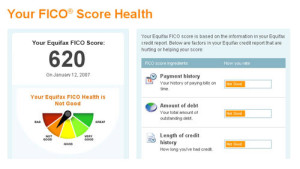 I had the pleasure of spending quality time brainstorming with Mikki Nasch, co-founder of AchieveMint, yesterday. Mikki worked on the early days of building the FICO score with Fair Isaac, so has been involved in Big Data well before it became the well-#hashtagged buzzword it is today.
I had the pleasure of spending quality time brainstorming with Mikki Nasch, co-founder of AchieveMint, yesterday. Mikki worked on the early days of building the FICO score with Fair Isaac, so has been involved in Big Data well before it became the well-#hashtagged buzzword it is today.
In our conversation, we talked about the history of FICO and how it took about a decade for consumers to understand it, accept it, and use it as a tool for bettering their credit ratings. When a FICO score was below an acceptable threshold to a lender – say, for a new car or home mortgage – a consumer felt the sting of having bad credit. The outcome at that moment-of-truth was a rejection for an auto or home loan, thus preventing the consumer from getting to “yes” for buying something they valued for their life, and their family’s lives.
People learned (repeat: learned) to connect the dots between spending, timely payments to credit card and financial service companies, and the FICO number. People learned how to adapt new behaviors (e.g., paying on time, tracking spending, etc.) and bent their personal FICO scores.
There could be a parallel for health; we ideated and built on that thought, and then lunchtime was over and we had to get back to our real-time work-lives.
That real-life includes Mikki and her team at AchieveMint corralling and analyzing data (from health care data silos, geographic location systems, self-tracking apps, and other data mines), coupled with behavioral economics to nudge and reward people for making healthy decisions.
Health Populi’s Hot Points: I’ve been working with my team at HealthcareDIY making the direct connection between health and wealth, financial wellness and our personal intrinsic feelings about health. We learned in the 2013 Health in America survey that people who regularly save money (regardless of whether that’s $25 a month or $1,000) rate themselves with higher health status. Health is wealth and wealth (wherever you are in relative terms), health.
As we approach the dreaded April 15 tax deadline, after which some of us might receive tax refunds, think about that ‘found’ money that you didn’t have the day before the check (or automated bank payment) arrived. Why not save it? You’ll feel better, sleep great that night, and who knows? Nudge your own personal “health FICO score” up a notch.




 Thank you FeedSpot for
Thank you FeedSpot for